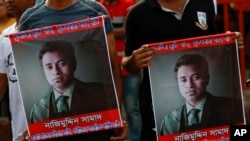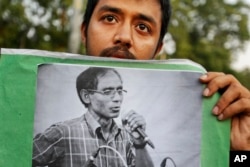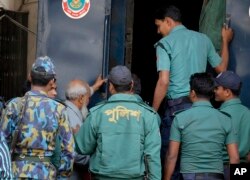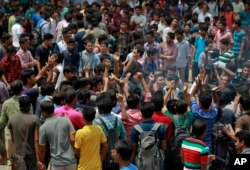A series of brutal killings of liberals, academics, bloggers, foreigners and religious minorities in Bangladesh has spread deep fear in the country and raised worrying questions about whether the secular traditions of a moderate Muslim country are under threat from extremist Islamic groups.
April was the deadliest month in the South Asian country: five grisly murders have targeted a Hindu man accused of insulting Prophet Mohammad, two gay rights activists, a university professor and a law student who criticized religious extremism on his Facebook page. The killings, often by machete-wielding assailants, began with the hacking of a blogger in 2013.
Affiliates of Islamic State and al-Qaida have claimed responsibility for almost all the attacks, but the government says these groups have no presence in the country and points the finger at homegrown militant groups.
Killings unresolved
But with most of the killings unsolved, there are no clear pointers to those behind the increasingly bold attacks. Although some low-level militant operatives have been arrested, police have made no headway in identifying those planning the attacks. Families of victims complain of slow and ineffective police investigations.
“We are in uncertain terrain and we are in a confused state of mind, whom to believe. The government is not giving any credible answer,” said Ataur Rahman, the head of Bangladesh’s Political Science Association.
'Radicalization'
Although most security analysts are skeptical about global jihadi groups making inroads in the Muslim country of 160 million people, they warn that Bangladesh has become a fertile ground for extremist Islamist groups to flourish as its political climate becomes deeply polarized.
“We see a big attempt in Bangladesh of radicalization. Those Islamist groups try to convince the remote area people in the name of religion, and try to motivate them to pursue the religious lifestyle,” said retired army Major General Abdur Rashid, the Executive Director of the Institute of Conflict, Law and Development Studies in Dhaka. He said the attacks by local militant groups are aimed at creating panic.
Crackdown on opposition
Several analysts link the series of killings to a controversial war crimes tribunal that during the last three years has convicted top leaders of the opposition Jamaat-e-Islami party for alleged atrocities in the country’s 1971 war of independence. Four senior opposition politicians, including three of the Jamaat-e-Islami have been executed, triggering huge anger in its cadres.
Rashid said among the local groups under scrutiny for the killings is the student group of the Jammat-e-Islami party, the Islami Chhatra Shibir.
“This application of violence was not new to their political philosophy. How much ideological motivation they have, I have my doubt,” he said, pointing out that most of the targets have not been high profile, but ordinary people with little protection and easy to pick out.
The Jamaat-e-Islami is not the only one marginalized. The country’s main opposition party, the Bangladesh Nationalist Party has also been sidelined since 2014 when Prime Minister Sheikh Hasina held on to power following an opposition boycott of the elections. Many opposition leaders were later arrested.
Ataur Rahman urged the government to give political space to the opposition.
Otherwise he said, “we see very ominous signs now that this militants will occupy the space, fill up the vacuum. There is strong authoritarian rule under democratic façade, and the liberal politics Bangladesh enjoyed for three decades, that is now non-functional.”
'Undermining culture of tolerance'
Besides crushing the opposition, critics accuse the government of undermining the country’s culture of tolerance by not coming out strongly in defense of the liberal and moderate values of those targeted by the Islamic extremists.
While Prime Minister Sheikh Hasina has condemned the killings, she has also said that people should watch what they write and speak, and that they have no right to speak out against religious beliefs. Other officials have blamed blogger victims for writing about religion.
Srinath Raghavan at New Delhi’s Center for Policy Research, who has written a book on Bangladesh, pointed out that such a line was definitely not in sync with the country’s secular constitution.
“That strikes me as a peculiarly wrong thing to say in this context because it more or less licenses the kind of behavior that we see playing out right now. All of it seems to me to be both muddying the waters and diluting the principles which are at stake,” he said.
In a country with a healthy tradition of tolerating religious minorities and allowing space for liberal values, some of the killings have led to street protests, but the climate of fear has prompted a few civil society activists to say they will be cautious in the days ahead.
Security analysts admit there are growing worries that Bangladesh could emerge as a new battleground for radical international Islamist groups as extremism rises in the country. They point out that Islamic State wrote an article titled “Revival of jihad in Bengal” in its online publication last year and in 2014, al-Qaida leader Ayman al-Zawahiri gave a call to bring Bangladesh into the Islamist fold.







